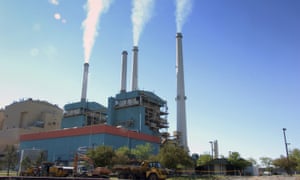Extract from The Guardian
Plan would allow individual states should decide how, or even if, they should stem carbon dioxide emissions from coal plants
The Trump administration
is set to unveil a proposed replacement for Obama-era climate change
rules that will impose looser, state-based regulations on coal-fired
power plants rather than pushing them towards closure.
The new plan is likely to escalate greenhouse gas emissions, compared with its predecessor, at a time when scientists have warned drastic cuts are required to avoid dangerous runaway climate change that would ravage the lives of Americans and people around the world.
The Environmental Protection Agency (EPA) is set to propose that individual states should decide how, or even if, they should stem carbon dioxide emissions from coal plants.
Donald Trump, who has pledged to end what he calls the “war on coal”, is expected to unveil the plan at an event in West Virginia, a major coal-producing state, on Tuesday.
“This is all about coal at all costs,” said Gina McCarthy, who was
EPA chief under Obama. “There is no other country in the world looking
to coal for its future. They are looking to clean energy.”
McCarthy said the new climate plan would provide industry a “free pass to increase not just carbon pollution but also conventional smog and soot pollutants that will directly harm our health today, not to mention our children’s future.”
The US is the second-largest emitter of CO2 in the world and any increase or even flatline in its emissions would make it extremely difficult for humanity to stave off punishing heatwaves, sea level rise and other consequences of climate change.
The Obama-era clean power plan imposed the first-ever national carbon pollution limits on coal plants and aimed to cut power sector CO2 emissions by 32% by 2030, compared with 2005 levels. However, after legal challenges by a coalition of states, it was paused by the supreme court in 2016 and has never come into force.
The Trump administration has argued the EPA exceeded its authority by imposing the rules and claimed that it would prove ruinous to coal-producing areas.
Under Trump, the US has announced its intention to exit the Paris climate accords, pare back vehicle emission standards and open up more lands and waters to oil and gas drilling.
The new plan is likely to escalate greenhouse gas emissions, compared with its predecessor, at a time when scientists have warned drastic cuts are required to avoid dangerous runaway climate change that would ravage the lives of Americans and people around the world.
The Environmental Protection Agency (EPA) is set to propose that individual states should decide how, or even if, they should stem carbon dioxide emissions from coal plants.
Donald Trump, who has pledged to end what he calls the “war on coal”, is expected to unveil the plan at an event in West Virginia, a major coal-producing state, on Tuesday.
McCarthy said the new climate plan would provide industry a “free pass to increase not just carbon pollution but also conventional smog and soot pollutants that will directly harm our health today, not to mention our children’s future.”
The US is the second-largest emitter of CO2 in the world and any increase or even flatline in its emissions would make it extremely difficult for humanity to stave off punishing heatwaves, sea level rise and other consequences of climate change.
The Obama-era clean power plan imposed the first-ever national carbon pollution limits on coal plants and aimed to cut power sector CO2 emissions by 32% by 2030, compared with 2005 levels. However, after legal challenges by a coalition of states, it was paused by the supreme court in 2016 and has never come into force.
The Trump administration has argued the EPA exceeded its authority by imposing the rules and claimed that it would prove ruinous to coal-producing areas.
Under Trump, the US has announced its intention to exit the Paris climate accords, pare back vehicle emission standards and open up more lands and waters to oil and gas drilling.

No comments:
Post a Comment